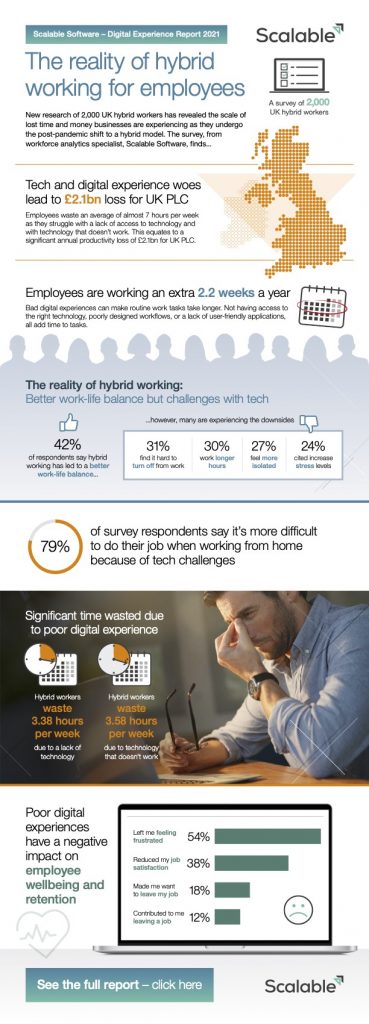
New research of 2,000 UK hybrid workers has revealed the scale of lost time and money businesses are experiencing as they undergo the post-pandemic shift to a hybrid model. The survey, from workforce analytics specialist, Scalable Software, finds an average of 6.96 hours per week are wasted as employees struggle with a lack of access to technology and with technology that doesn’t work. This equates to a significant annual productivity loss of £2.1bn for UK PLC.
The survey also highlights the impact that substandard technology and poor digital experiences are having on wellbeing. Employees are working an extra 2.2 weeks a year because of poorly designed workflows, a lack of user-friendly applications and because they are not equipped with the right technology.
“The world of work has undergone its biggest transformation in decades and many businesses are still struggling to adapt. Inadequate technologies and poor experiences are costing organisations billions in terms of productivity. This clearly is not sustainable,” said Mark Devereux, CTO, Scalable Software. “There’s no doubt that spotting and rectifying technology or wellbeing issues is harder when the workforce is dispersed, but organisations must act now to cut out this waste. This means ensuring an in-depth understanding of employee’s hybrid working experience.”
The research shows that organisations are aware of the need to treat digital experience with importance, 79% of hybrid workers say their employer has realised they need to pay more attention to digital experience and employee wellbeing in a hybrid model.
Yet despite increased awareness, only 51% of employees report a good digital experience at work. This has a knock-on effect on worker wellbeing. More than half (54%) say poor digital experiences have left them feeling frustrated and 38% say it has reduced job satisfaction. The risk to businesses is that unhappy workers will simply leave; 30% say a substandard digital experience has either made them want to leave a job or has contributed to them leaving a job.
Devereux added that, as hybrid working becomes a mainstay of 21st century life, it’s time for a ‘new approach’.
He said: “Organisations need sophisticated workforce analytics that bridge the gap between IT and HR and provide common and consistent metrics. This includes data from physical technology assets, as well as insights into an individual’s working patterns and interactions. When businesses understand the digital journey in detail, they can make changes to measure, optimise and transform the employee experience and stop time and money being wasted.”
Employers must address these issues and take steps to preserve the benefits of hybrid working while protecting staff.
Click below to share this article

